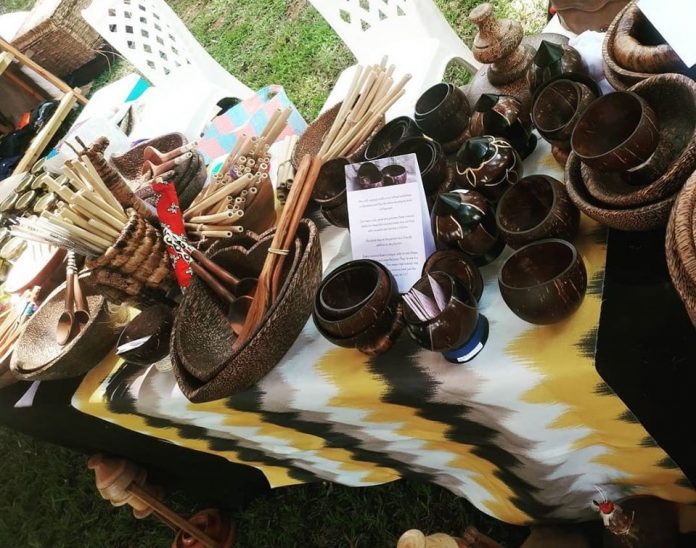Not so long ago, Judy Kabechu would elbow her way through the crowded Gikomba market in downtown Nairobi looking for a craftsman to sand and polish her stash of dried coconut shells into bowls.
Initially, the organic bowls were for own use at her home, but soon friends and neighbours took delight in them. Then orders started coming through. And just like that, she was in business.
Today, the 30-year graduate of Computer Information Systems runs two workshops – Nairobi and Diani – where she has a collection of beautiful coconut bowls, alongside bamboo straws under the brand name Bakuli Organics. Bakuli is Swahili word for bowl.
Never mind she concurrently owns and runs an IT firm – Goodkat Technology.
“As an environmental conservationist at heart, I used to be bothered by the many plastics everywhere, yet no one seemed to care about it. I felt the ban on single-use plastic carriers wasn’t enough. On a personal level, I had to do something,” the mother of two said in an interview.
From doing it all in the beginning, she now has an army of workers and is exploring exports avenues for the environmentally-friendly home and hotel utensils.
Besides opening up job opportunities and promoting use of organic utensils, her business has offered coconut farmers at the coast an income lifeline.
Kabechu says that the bamboo straws can be reused for up to one year, and are ecofriendly even after being discarded. As an environmental evangelist, and leading from the front, she always carries bamboo straws in her handbag for own use whenever she visits hotels. Besides, such visits provide her with the opportunity to convert other patrons around her.
“Before we place orders, we look for certain qualities in a coconut tree and the fruit. This is because the coconut bowls should naturally have a rounder shape and a flat base,” she said.
“We also produce strong, darker-toned bowls from the coconut tree trunk.”

The environmentalist said that she sources her coconuts from the coastal Tiwi region in Diani, Kwale County. As for the bamboo sticks, she sources from Kikuyu. Today, she has a team that crafts the organic utensils in her workshops, alongside those on the ground that assess the quality of the coconut trees and marketers.
Her journey has, however, been full of bumps.
“When I was initially looking for raw materials, I faced a lot of backlash from the coastal region. Being a woman I was expected not to be so aggressive or take on the leadership role. I had to stand firm and be decisive about what I wanted. Sustainable living is a new concept that people have yet to start embracing especially in informal settings” said Kabechu.
She says that it’s especially difficult to eliminate the plastics menace in informal settlements where ‘kadogo economy’ thrives. Here, basic goods are packaged in small plastic bags as a way of making it affordable to poor households. Unfortunately, much of this ends up in unplanned dumpsites around homes, creating eyesores.
To sharpen her skills and stay at the tip of the innovation curve, she has joined hands with other like-minded institutions.
“I joined an association called Ubunifu which has been a great supporter of my work. It has helped me hone my skills, meet like-minded impact entrepreneurs and guided me through challenges,” said Kabechu.
For instance, it was through Ubunifu that she joined the Export Promotion Council (EPC), lighting a fire inside her to explore the exports market.
She has equally joined SheTrades Global – a World Trade Organization initiative that trains women on sustainable business practices.
To ensure she has her pulse across the value chain, she advises farmers on sustainable coconut growing and harvesting, and actively participates in programmes organised by the Coconut Board.
“After joining the Export Promotion Council, I now have plans to export some of my organic products even as I grow my operation in the local market.”
How does she balance her work-family life?
“As busy as I am, I always have family time which allows me to decompress and relax. I do not accept any business calls from 7 pm,” she says.
Currently, her startup sells extra coconut flesh from the shells to chicken farmers, which they mix with chicken feed.
Gazing into the horizon, her plan is to set up a coconut oil manufacturing factory in coming years.
“I know that whatever small contribution one makes to ensure a clean environment, the impact is felt in the long run. My plan for the future is to set up an exhibition space where the public can see the process of making my coconut bowls, bamboo straws and utensils. That way, they can have a sense of appreciation for using eco-friendly items,” she signs off.
Read also: How Green Financing Is Fuelling Sustainable Projects



